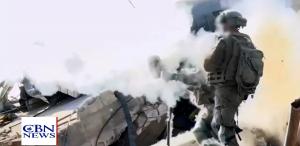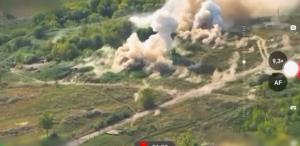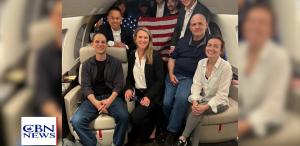Putin: Russia’s Next Czar?
The Bush Administration has chastised Vladimir Putin for backsliding on democracy and amassing personal power.
Transcript
ST. PETERSBURG, Russia - As American troops give their lives in Iraq to spread democracy around the world, the people of Russia are facing a stark reversal of their democratic rights.
It's a retreat from democracy that comes just 15 years after Boris Yelstin's standoff with the Soviet Union from a tank turret in Moscow that marks the collapse of Communism in Russia.
In a nation conditioned by centuries of czarist rule and decades of Communist control, Russians seem satisfied with the pace of democratic progress:
"It's much better than it was before. There are a lot of privileges. Now there is food in the supermarkets."
"We have so many changes that it justifies what's going on now. Putin's priority is order, but changes are never smooth in a transition to democracy."
But Western observers say that the tide of freedom turned in 1999 when Boris Yeltsin handed the presidency to Putin, his handpicked successor and a former agent with the Soviet Secret Police.
Joel Rosenberg is a political analyst and author of the book Epicenter, from the moment Vladimir Putin rose to power, he says, he began building up the military and alliances with anti-Western, authoritarian regimes.
The ex-kgb colonel, Rosenberg says, has become the "anti-Democrat- in-chief."
"Freedom is getting in Putin's way. Putin wants to be the new czar of Russia,” said Rosenberg. “He is not interested in a democracy. He is rolling back freedoms. [His goal is] to be a czar and to rebuild the Russian empire."
Raised in St. Petersburg, the home of Peter the Great and the Russian czars, Putin has stated that Russia should be a free and democratic society, but one based on Russian traditions, "not Western ideals."
As president, Putin restored some traditions of the past Soviet tyranny, reviving the Communist flag as a military symbol. He also restored the Soviet national anthem.
In a speech last year, Putin called the collapse of the Soviet Union "the greatest catastrophe of the 20th century."
Rosenberg said, "Now a speech like that gives you a window into his soul. And his world view is that Russia needs tough Stalinistic leadership and needs to rebuild the Russian empire."
In 2004, putin’s Kremlin abolished direct elections for the nation's regional governors. The now presidentially-appointed governors could move to amend Russia's constitution, allowing Putin to run for a third term in 2008.
That's sparked speculation that Putin could cling to power long after his term expires, signaling the end of democracy and the rise of a new Russian emperor.
“Now if the governors are directly elected by the people there's a lesser chance he'll continue in power,” Rosenberg said. “If he appoints them, then he controls them. That's where I see we'll see a real crisis emerging over the next 18 months, if Putin decides to stay in office.”
Beyond that, Rosenberg says the trend toward a new Russian empire is one the rest of the world, and particularly the United States, cannot ignore.
“When you watch the anti-democracy move he's making in Russia and the alliances he's building with Islamic countries like Iran, you begin to see how that world view is playing out, and this is what President Bush and the American government right now have to confront.”
Since taking office, Putin has consolidated Moscow's grip on political speech, the economy, religion, and the press.
In a state takeover of major Russian oil companies, some suspect that the Kremlin engineered the sentencing of oil tycoon Mikhail Khodor-Kovsky to nine years in a Siberian jail.
Russia's leaders deny any muzzling of independent media. But Putin supporters have controlling interests in the nation's main newspapers, radio, and television channels. The state also is tightening control over the religious community.
A new state department report on religious freedoms cites Russia for its poor protection of religious minorities.
Though the Russian Orthodox church enjoys favor with Putin officials, many religious groups report a rise in harassment, persecution, and threats. Too often ignored by officials.
Igor Nikitin, of the Association of Christian Churches of Russia, said, "The government can protect our human rights, can protect us as citizens of Russia, but it's not been happening so far.”
Churches are now required to register and file cumbersome reports, under a new law that clamps down on non-governmental organizations, or ngos.
“It's become quite a problem for all of us,” Nikitin said. “It's not just requiring groups to register with the government, it's controlling everything, all that NGOs are doing."
Churches and ngos are now seen as subversive agents that undermine the Putin regime. One example is the Orange Revolution that was, in part, religiously motivated, and led Ukraine’s breakaway from Russia’s sphere of influence.
“They also say they're spies from the West. That's why they want to increase control over the NGOs and their operations. That also gives them the right to close a non-government organization for no particular reason,” said author Anna Parechkevova.
When Ukraine voters rejected the Putin-backed candidate in favor of a pro-Western Democrat, Russia cut off the country's winter supply of oil.
Rosenberg said, “It was punishment. Putin was sending a message: 'Don't mess with the Kremlin. If you get in our way, we have ways to deal with it.'”
Putin's democratic reversal hasn't seemed to get in his way or hurt his popularity. His approval ratings are soaring at 59 percent.
The Bush administration has chastised Putin for backsliding on democracy and amassing personal power. But critics say it will take more than words to stop Russia's retreat from democracy and return to the path of freedom.
Download
Right-click on a link below and choose "Save link as..." to save the file
High Definition - MP4
High Quality - MP4
Low Bandwidth - MP4





